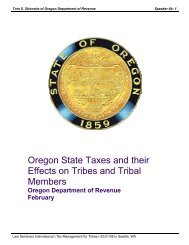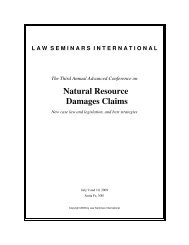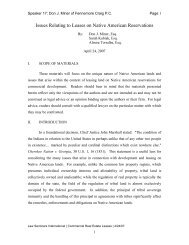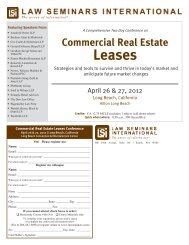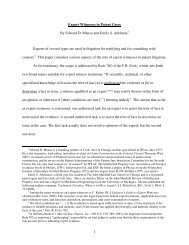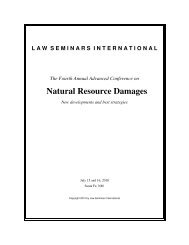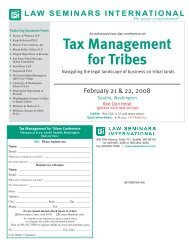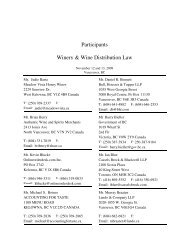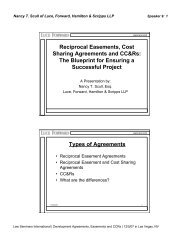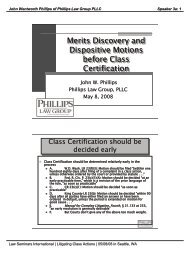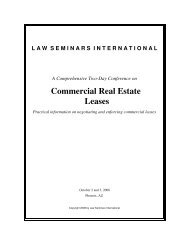LSI 2010 Real Estate Joint Ventures conference materials.pdf
LSI 2010 Real Estate Joint Ventures conference materials.pdf
LSI 2010 Real Estate Joint Ventures conference materials.pdf
Create successful ePaper yourself
Turn your PDF publications into a flip-book with our unique Google optimized e-Paper software.
John W. Hanley, Jr. of Davis Wright Tremaine LLP Speaker 20a: 4<br />
2. Economic Terms of <strong>Real</strong> <strong>Estate</strong> Investment Fund.<br />
Preliminary Comments. An investment in commercial real estate will typically produce<br />
two forms of return, if the asset is managed in a profitable manner. First, during the fund’s<br />
ownership, the property should generate net cash flow from operations, that is, rents and/or other<br />
forms of revenue above and beyond the receipts required to pay current period operating<br />
expenses, taxes, insurance, and mortgage debt service. Second, upon sale of the asset, the fund<br />
may expect to realize net sale proceeds in excess of the amounts required to retire the asset’s<br />
mortgage debt and pay transactions costs. 3 Thus, the real estate fund formed to take ownership<br />
positions in a range of commercial real estate properties will normally expect a recurring stream<br />
of earnings of both types during its projected life. Distributions of such proceeds by the fund to<br />
its investors will be governed by the fund documents and made according to the formula(s) for<br />
splitting profits contained in those documents. The fund manager will typically have some<br />
discretion in determining the timing and gross amounts of cash distributions, 4 but, when the<br />
manager is ready to send cash to the fund participants, he will be required to comply with the<br />
distribution formulas in the governing fund documents (the “waterfall” discussed below).<br />
The real estate investment fund will be structured as a “pass-through” entity for purposes<br />
of federal income taxation, usually either a limited liability company or a limited partnership.<br />
Use of a limited partnership is more common if foreign investors will be solicited, because of the<br />
terms of double taxation treaties in certain foreign countries. Profits realized by the fund from its<br />
investments in real estate assets will not be taxed by the federal government at the fund level.<br />
Under Subchapter K of the Internal Revenue Code (partnership taxation), profits and losses<br />
realized by the fund will be allocated to its owners, for reporting on the tax returns of those<br />
members or partners, according to the allocations provisions found in the fund documents<br />
(subject to certain requirements and limitations in IRC Subchapter K). Thus, the prospective<br />
fund investor must consider the impact of future tax allocations in order to calculate the potential<br />
net after-tax return from a proposed fund investment. (The “preferred return” promised in the<br />
fund documents will be stated on a pre-tax basis.) The investor must also consider the possibility<br />
that, in one or more years, the fund will allocate taxable income or gain to the investor, creating a<br />
tax liability, without making any cash distributions to it before that federal income tax on that<br />
(b) tax-exempt investors, who are subject to a special regime of taxation with respect to unrelated<br />
business taxable income (UBTI), which can be problematic with respect to debt-financed income; and<br />
(c) ERISA-regulated investors, also known as benefit plan investors, whose presence in a fund above<br />
a certain percentage (normally 25%) would trigger almost unbearable regulatory requirements on the plan sponsor<br />
unless the plan sponsor limits the fund’s investments to REOC’s and VCOC’s.<br />
This paper will not discuss the legal requirements or issues unique to these types of potential investors in a real<br />
estate fund.<br />
3 Of course, another form of “capital event” which can yield net cash proceeds to the owner is a refinancing of the<br />
current mortgage debt.<br />
4 Typically the manager will be subject to certain other requirements in the fund documents related to tax<br />
distributions, the use of cash to establish reserves, and distributions upon sold amount or liquidation of the fund.<br />
DWT 13620946v1 0000099-071219<br />
Law Seminars International | <strong>Real</strong> <strong>Estate</strong> <strong>Joint</strong> <strong>Ventures</strong> and Funds | 02/09/10 in Seattle, WA<br />
3




